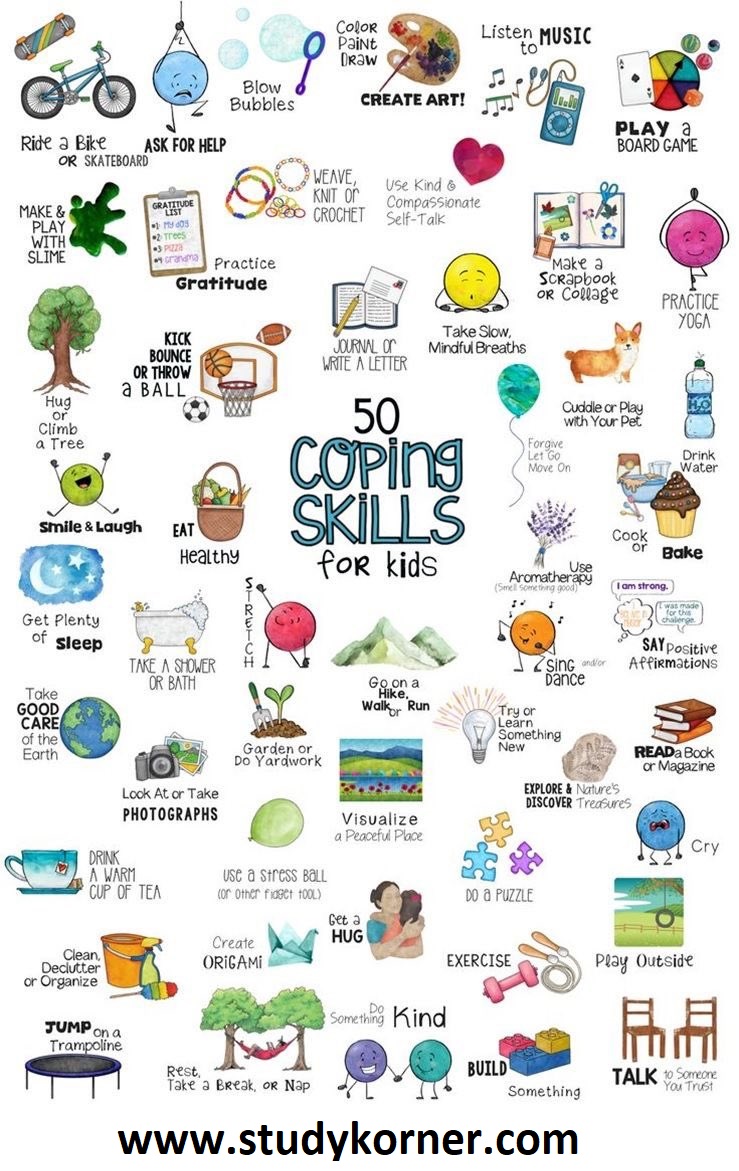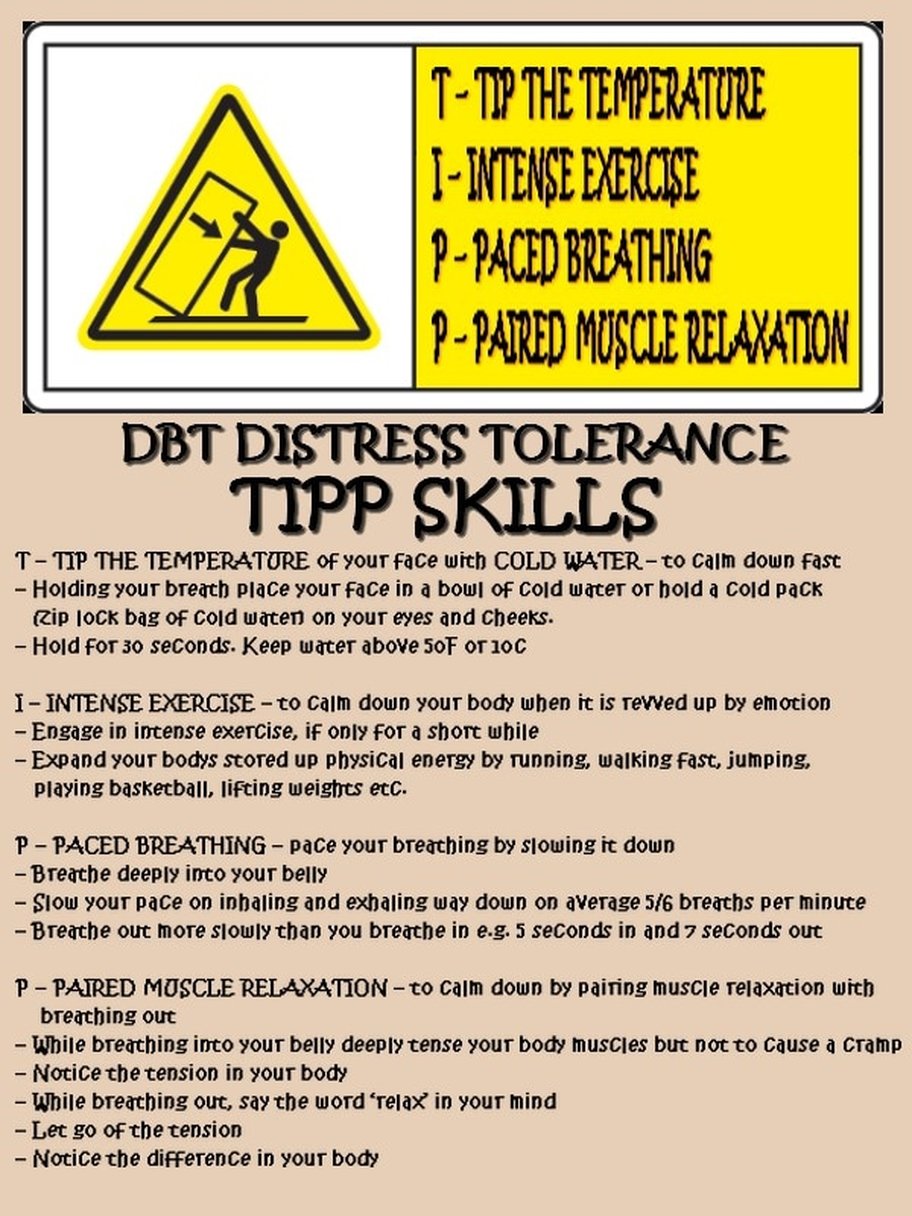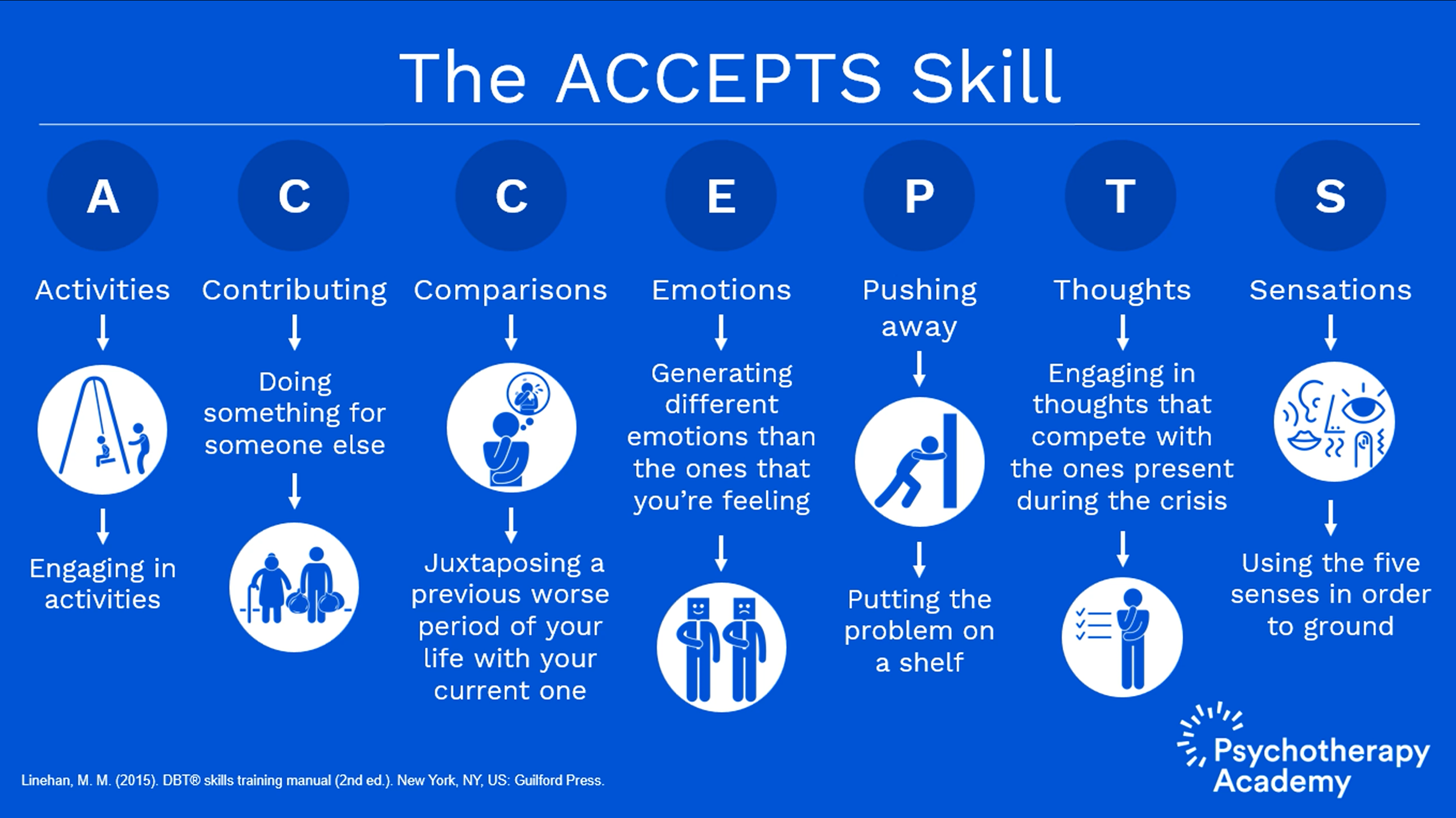
Coping Skills Wheel For Kids
Distress Tolerance skills are used when we are unable, unwilling, or it would be inappropriate to change a situation. It's important to use the right skills at the right time. In order to change a situation or emotion, we would use Emotion Regulation skills (page 21). Distress Tolerance skills are used to help us cope and survive during a.

Dbt Therapy, Dialectical Behavior Therapy, Therapy Worksheets, Therapy
TIP Skills: Changing Your Body Chemistry . To reduce extreme emotion mind fast. Remember these as TIP skills: T. IP THE . TEMPERATURE of your face with COLD WATER * (to calm down fast) • Holding your breath, put your face in a bowl of cold water, or hold a cold pack (or zip-lock bag of cold water) on your eyes and cheeks. • Hold for 30 seconds.

Tipp Skills Worksheet
The TIPP skills are a collection of fast-acting techniques to rapidly change body chemistry during moments of intense emotions. OVERVIEW This practice will provide ways we can adjust our physiology and calm our stress response. WHAT IS NEEDED Access to cold water or an ice pack.

Distress Tolerance Skill TIPP r/SelfCareCharts
TIP Skills: Changing Your Body Chemistry To reduce extreme emotion mind fast. Remember these as TIP skills: !IP THE TEMPERATURE of your face with COLD WATER* (to calm down fast) • Holding your breath, put your face in a bowl of cold water, or hold a cold pack (or zip-lock bag of cold water) on your eyes and cheeks. • Hold for 30 seconds.

TIPP Technique (1) Pulse
TIPP Skills are a set of super easy skills to help with overwhelming emotions and in crisis situations. TIPP stands for: • T emperature. • I ntense Exercise. • P aced Breathing. • P aired Muscle Relaxation. Download our TIPP Skills resources: BROCHURE | LEAFLET | POSTER. For more information on how TIPP Skills are used in our.

Printable Dbt Skills Cheat Sheet
TIPP is an acronym that stands for the following four steps: temperature, intense exercise, paced breathing, progressive muscle relaxation. 2. Instructions. Practice each of these techniques, so you know what they feel like. Then use them, when you feel overwhelming emotion and you feel like you need them.

Distress Tolerance Worksheets Bundle PDF Templates TherapyByPro
Distress Tolerance Skills help you to cope with, tolerate or accept pain and distress as part of life. Together with the Mindfulness Skills, Emotion Regulation Skills and Interpersonal Effectiveness Skills discussed in the other three Patient Education Manuals, the skills discussed in this manual are meant to help you to tolerate and survive.

TIP Skill DBT Distress tolerance, Dialectical behavior therapy
TIPP You're at your emotional breaking point. Maybe the worst has happened, or maybe it was just the "last straw". The DBT distress tolerance skill you need is TIPP.. The DBT distress tolerance acronym ACCEPTS is a group of skills to help you tolerate a negative emotion until you are able to address and eventually resolve the situation.

Dbt Thought Stopping Worksheet worksSheet list
TIP Skills: Changing Your Body Chemistry To reduce extreme emotion mind fast. Remember these as TIP skills: T TIP THE TEMPERATURE of your face with COLD WATER* (to calm down fast) • Holding your breath, put your face in a bowl of cold water, or hold a cold pack (or zip-lock bag of cold water) on your eyes and cheeks. • Hold for 30 seconds.

Distress tolerance skills refer to a type of intervention in Dialectical Behavioral Therapy (DBT) where clients learn to manage distress in a healthy way. These skills are helpful for situations where a client might not be able to control a situation, but they need to manage their own response. Use this DBT worksheet to summarize distress.
Coping Skills Worksheets Pdf Stress Management Activity Bundle
This skill is done by trying to slow your breathing right down. Take a deep breath in, count the seconds of that breath, now breathe out through your mouth slowly, trying to breathe out 1-4 seconds longer than you breathed in for. Repeat until you feel a change in your emotional state. This induces a calming effect, by you communicating to.

Tipp Skills Worksheet
Distress Tolerance Skill 1: TIPP TEMPERATURE Change your body temperature. Splash your face with cold water, hold an ice cube, let car AC blow on our face, take a cold shower INTENSE EXERCISE Do intense exercise to match your intense emotion. Sprint to the end of the street, do jumping jacks, push ups, intense dancing PACED BREATHING

Distress Tolerance Skills Part 1 Crisis Survival Skills
The TIP skill is intended to quickly change your body chemistry in order to reduce the effects of an overwhelmed emotional mind; where your thinking and behaviors seem to be controlled by your overwhelming emotions. Tip the temperature. Tip the temperature of your face with ice water (to calm down fast). Hold your breath, put your face in a.

TIPP Distress tolerance skill poster, DBT poster LightandSaltDesign
worksheet. Dialectical Behavioral Therapy (DBT) uses the concept of a reasonable, emotional, and wise mind to describe a person's thoughts and behaviors. The reasonable mind is driven by logic, the emotional mind is driven by feelings, and wise mind is a middle-ground between the two. In DBT, clients will learn skills to use their wise mind and.

Marsha Linehan Dbt Skills Training nonlitropical
TIPP STANDS FOR: Tip the Temperature. Intense Exercise. Paced Breathing. Paired Muscle Relaxation. The acronym helps you remember the skills involved in the calming down process, which lets you act quickly and effectively when you are in the middle of extreme emotional turmoil. Sometimes, when folks are experiencing strong and upsetting.

Muscles In Your Body, Difficult Conversations, Just Give Up, Fight Or
TIP Skills: Changing Your Body Chemistry To reduce extreme emotion mind fast. Remember these as TIP skills: T TIP THE TEMPERATURE of your face with COLD WATER* (to calm down fast) • Holding your breath, put your face in a bowl of cold water, or hold a cold pack (or zip-lock bag of cold water) on your eyes and cheeks. • Hold for 30 seconds.